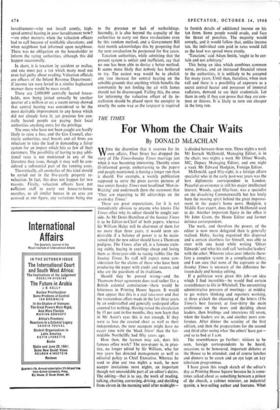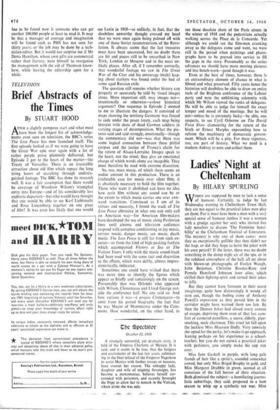For Whom the Chair Waits
THE TIMES
By DONALD McLACHLAN
WrrH the discretion that it reserves for its own affairs, Fleet Street has dropped the story of The Thnes-Sunday Times marriage just when it was becoming interesting. Thereby some ill-informed gossip, embarrassing to the papers and people mentioned, is having a longer run than it should. For example, a weekly publication supposed to serve the press carries pictures of two senior Sunday Times men headlined 'Men-in- Waiting' and underneath them the statement that 'They are expecting to fill editorships on the seven-day Times.'
These are great expectations, for it is not immediately obvious to anyone who knows The Times office why its editor should be sought out- side. As Mr Denis Hamilton of the Sunday Times is to be Editor-in-Chief of both papers, whereas Sir William Haley will be chairman of them for no more than three years, it would seem un- desirable if a balance of power is to be main- tained that the new editor should have a Thomson pedigree. The Times, after all, is a famous, train- ing stable, buying in yearlings cheap and losing them as three-year-olds to racing stables like the Sunday Times. Its staff will expect some con- sideration for the claims of those who have been producing the paper with credit and success, and who are the guardians of its traditions.
Should they be proved wrong—and the Thomson-Astor agreement does read rather like a British colonial constitution—there would be bitterness in Printing House Square. It would then appear that this is a real take-over and that the tremendous effort made in the last three years by an understaffed and generally underpaid office counted for nothing. Having raised the circulation by 15 per cent in five months, they now learn that in Mr Astor's eyes this is not enough. If they were to lose the coveted chair as well as their independence, the next occupant might have no easier time with the 'black friars' than the for- midable Northcliffe had fifty years ago.
How then, the layman may ask, does this famous office work? The newspaper is, in prac- tice, no longer edited by Sir William, who for two years has directed management as well as editorial policy as Chief Executive. Whereas he used to dine out two nights a week, he now accepts invitations most nights, an important though not unavoidable part of an editor's duties. The editing—that is to say, the work of reading, talking, chairing, correcting, driving, and deciding from eleven in the morning until after midnight—
is divided between three men. Three nights a week Mr Iverach McDonald, Managing Editor, is in the chair; two nights a week Mr Oliver Woods, MC, Deputy Managing Editor; and one night a week Mr Edward Hodgkin, Foreign Editor.
McDonald, aged fifty-eight, is a foreign affairs specialist who in the early post-war years was the best diplomatic correspondent in London. Peaceful co-existence is still his major intellectual interest. Woods, aged fifty-four, was a specialist on the dissolving Commonwealth but has lately been the moving spirit behind the great improve- ment in the paper's home news. Hodgkin, a Middle East expert, does the job McDonald used to do. Another important figure in the office is Mr John Grant, the Home Editor and former defence correspondent.
The work, and therefore the power, of the editor is now more delegated than is generally realised. Haley, having organised this dispersal and-a certain aloofness for himself, was able to steer with one hand while writing 'Oliver Edwards' and what his staff call 'revivalist leaders' with the other. Whoever takes over inherits there- fore a complex system in a complicated office; and I am sure that none of the aspirants at the Sunday Times is unaware of the difference be- tween daily and Sunday editing.
If a politician were given this job—an idea whigh I find incredible—he would find certain resemblances to life in Whitehall. The unremitting administrative pressure of meetings : at midday to get writers thinking and reporters working, at three o'clock the choosing of the letters (The Times's best feature), at four-thirty the main conference on the news and deciding about leaders, then briefings and interviews till seven, when the leaders are in, and another news con- ference. After dinner the scrutiny of the first edition, and then the preparations for the second and third after seeing what 'the others' have got— and so to bed at 1 a.m.
The resemblances go further: visitors to be seen, foreign correspondents to be heard, occasions to be honoured, important debates at the House to be attended; and of course lunches and dinners to be eaten and an eye kept on key television programmes.
I have given this rough sketch of the editor's day at Printing House Square because he is some- times talked about as something between a prince of the church, a cabinet minister, an industrial tycoon, a best-selling author and Socrates. What has to be found now is someone who can get another 100,000 people at least to read it. It may be that a manager of courage and imagination will be found such as PHS has not seen for thirty years; or the job may be done by a tech- nician-editor. But it would not surprise me if Mr Denis Hamilton, whose own gifts are commercial rather than literary, were himself to reorganise the management with the aid of Thomson know- how, while leaving the editorship open for a while.







































 Previous page
Previous page